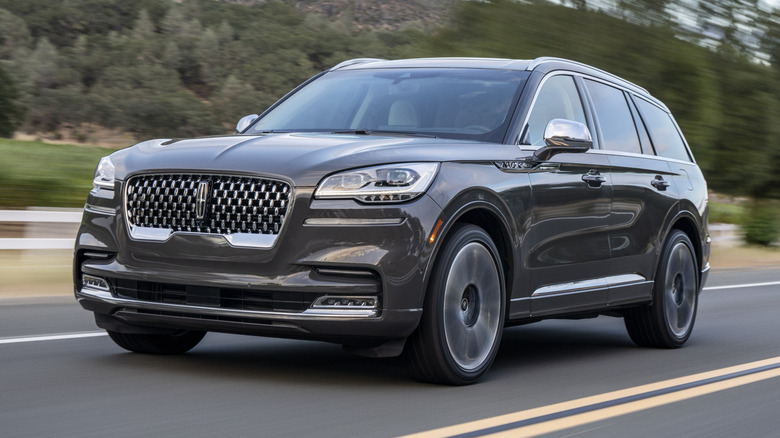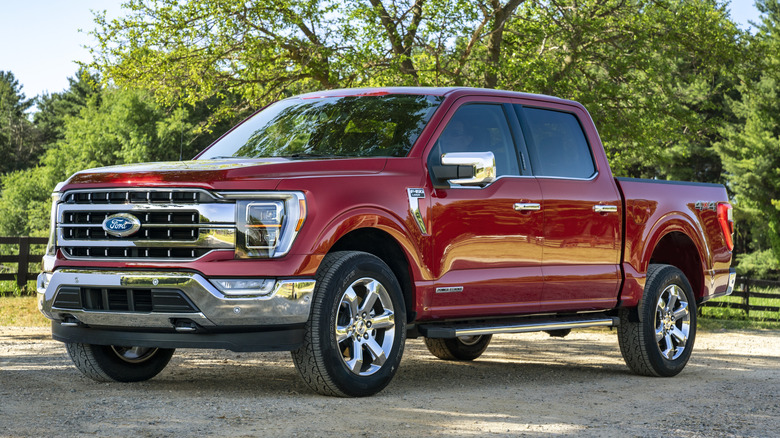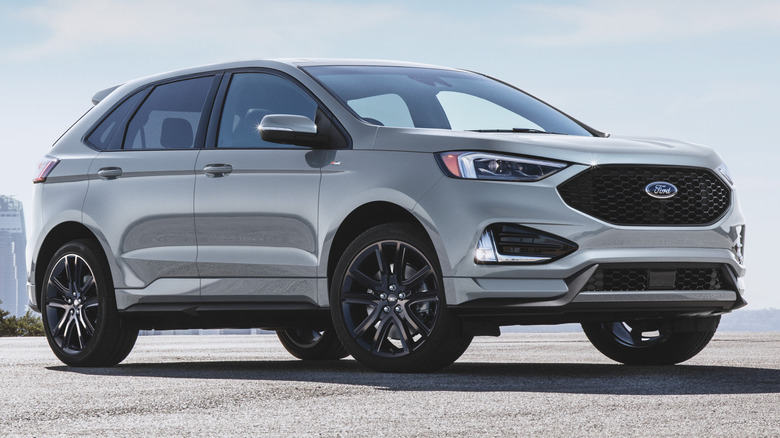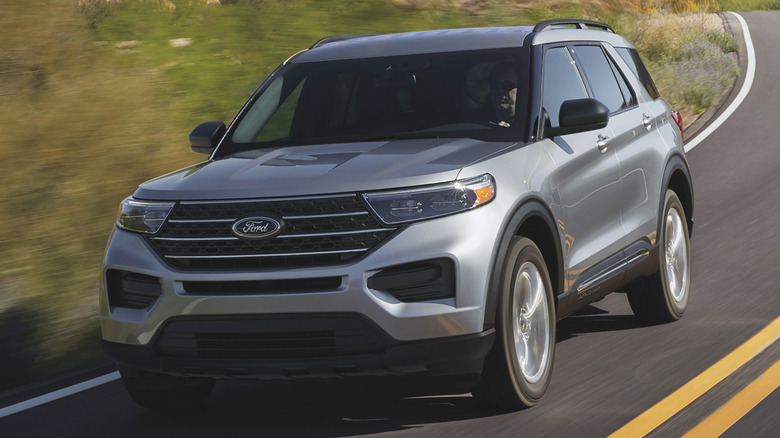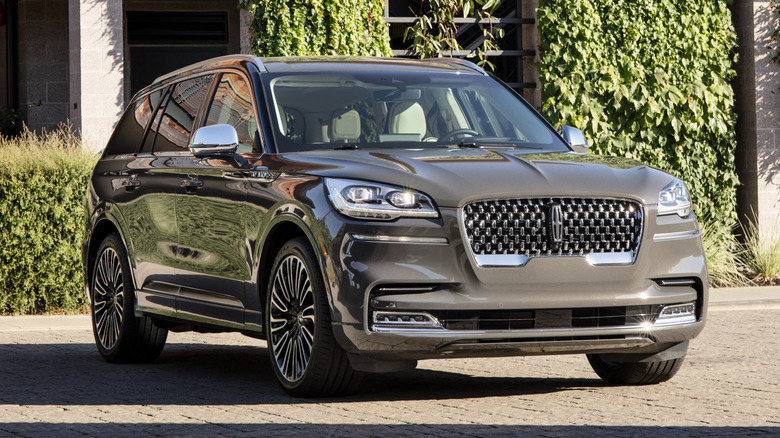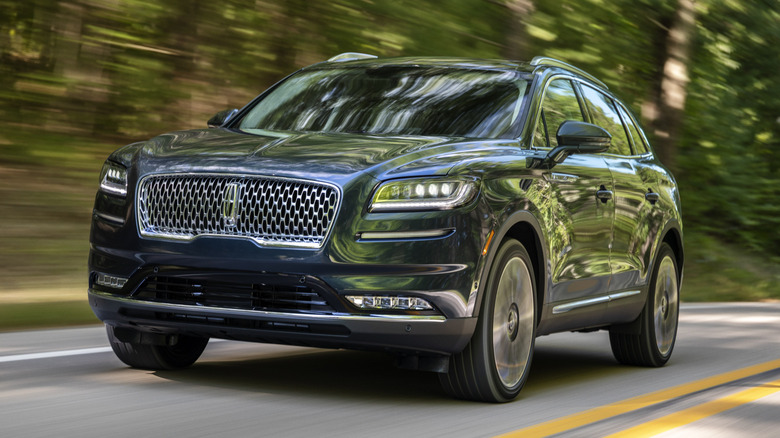Every Vehicle Affected By The Ford EcoBoost V6 Engine Lawsuit
Ford has not had a good 2025. Not only has it had to deal with major recalls, such as a steering issue that led to the recall of 115,000 trucks and a rearview camera issue that now involves 1.4 million vehicles, but it's also now dealing with a lawsuit involving its 2.7- and 3.0-liter EcoBoost V6 engines. The class-action lawsuit, initiated by two owners of EcoBoost V6-powered Fords, follows an NHTSA investigation into 2021 and 2022 Fords with EcoBoost V6 engines, which led to a recall (NHTSA recall number 24V-635) of several V6 Ford and Lincoln models.
The recall, while small compared to others, still involved 90,736 Fords and Lincolns, all powered by either the 2.7- or 3.0-liter EcoBoost V6. Beyond fixing the issue, Ford also extended the warranty for affected vehicles to 10 years or 150,000 miles. But that didn't stop dissatisfied owners from taking the automaker to court. The two plaintiffs suing Ford are Matthew Barkus, from Pennsylvania, and Dan Silberman, from New York. Barkus is a Ford F-150 owner, while Silberman has a Ford Bronco; both have the 2.7-liter EcoBoost V6 under the hood.
Beyond the Ford F-150 and Bronco, other models affected include the Ford Edge and a couple of Lincoln SUVs, namely the Aviator and Nautilus. Note that while most of these models used, and continue to use, the EcoBoost V6 beyond 2021 and 2022, those are the only model years affected thus far. Vehicles (and, presumably, engines) outside of this unfortunate two-year period are safe. Unless some other issue pops up later, of course.
Ford F-150
Ford's ever-popular F-150 makes up the bulk of the recalls it issued, with 47,719 F-150s built between May 1 and October 31, 2021, affected. These cover the 2021 and 2022 model years of the Ford F-150, both of which were available with a wide range of engines, including several V6s. Two of these six-cylinder engines came from Ford's EcoBoost engine family: These were the 325-hp 2.7-liter V6 and the larger 400-hp 3.5-liter EcoBoost V6, the latter of which seems to have escaped the issues that plagued its smaller siblings.
The 47,719 2021 and 2022 F-150s are a small percentage of the nearly 1.4 million F-Series trucks the automaker sold across both years, so it's not necessarily a crippling issue for the F-150's reputation. That said, given Ford's general unwillingness to break F-Series sales down by model, we're not sure what the proportion of afflicted F-150s is.
Engine issues aren't the only faults that have prompted Ford to recall 2021 and 2022 F-150s, though. There are 25 and 20 recalls, respectively, for the F-150 listed on the NHTSA website. These include some we mentioned earlier, such as the rearview camera issue, as well as others involving problematic fuel pumps and failure-prone trailer brakes.
Ford Bronco
Ford's legendary off-road SUV returned with a flourish for the 2021 model year, boasting a wide range of trim levels (a trait that continues to this day) and two EcoBoost engines under the hood. Most versions of the 2021 Bronco had the 2.3-liter inline-4 EcoBoost as standard, with the 2.7-liter EcoBoost V6 available as an option. Of the seven trims, only the Wildtrak and First Edition Broncos had the 2.7-liter EcoBoost V6 as standard. The setup continued into 2022, albeit with the First Edition trim logically no longer available.
The NHTSA recall notice lists 15,835 2021 and 2022 Broncos as being affected by the faulty engines, with these models built between May 1 and October 30, 2021. Ford sold just over 200,000 Broncos across both years, so there are easily more Broncos out there with trouble-free engines. Or, well, engines that haven't yet proved problematic, if one were to take a more pessimistic view of the situation.
Ford's revived Bronco was generally well received, with automotive journalists of the time praising its retro styling and off-road prowess. Despite that, these early Bronco years haven't been without their problems: Beyond the 2.7-liter V6, early Broncos have also been subject to recalls related to a faulty fuel pump (which even led to an NHTSA investigation) and a rear shock absorber reservoir that could come loose from the SUV, among others.
Ford Edge
The Ford Edge did not have a particularly exciting final few years. With few major updates since a 2019 refresh that brought new styling, bumped engine output up slightly, and introduced the performance-minded Edge ST, the 2020s Ford Edge was far from the freshest SUV on the market. That said, it still sold reasonably well, albeit not quite on par with the more exciting Bronco, justifying Ford's decision to offer minimal updates to the SUV before discontinuing it in 2024.
Ford offered two engines in the 2021 Edge: Most trim levels had the 2.0-liter inline-4 EcoBoost as standard, while the 2.7-liter V6 was the only engine in the Edge ST, paired with all-wheel drive. Ford claimed that the Edge ST's V6 was tuned by its in-house Ford Performance Team, with the engine making 335 hp as a result. The NHTSA's recall notice indicates that 2,366 of these Edge STs were equipped with the faulty 2.7-liter EcoBoost V6s, and that these left Ford's factories between May 10 and October 29, 2021.
Troubled engine aside, the 2021 and 2022 Ford Edge seems to be a reliable vehicle. The only other recalls were for the aforementioned rearview camera problem, and there are surprisingly few owner complaints logged on the NHTSA website as well.
Ford Explorer
The Ford Explorer has been an immensely popular member of Ford's SUV lineup since its 1991 debut. Unfortunately, it hasn't always had a stellar time in the reliability stakes, with several model years, including the early 2020s models, standing out as Ford Explorer years to avoid. While the 2020 Explorer is the one that stands out, the 2021 and 2022 Explorers aren't all that great either, with roughly 20 recalls for each covering widespread faults — such as iffy fuel pumps and glitchy rearview camera displays — and ones limited to the large SUV, including a disconnecting driveshaft issue.
Both model years were also, of course, plagued by EcoBoost V6s with problematic valvetrains. To be precise, 14,262 Explorers, built between June 7 and October 31, 2021, shipped with 3.0-liter EcoBoost V6s that Ford identified as requiring repair. It's worth noting that the 2021 Explorer came with two versions of the 3.0 V6: The Explorer ST came with an "enhanced" 3.0-liter EcoBoost V6 good for 400 hp and 415 lb-ft of torque, while the luxury-oriented Explorer Platinum came with a 365-hp V6 instead.
Ford carried the engine setup into 2022, although it introduced an ST-Line trim for those who wanted the ST's sporty looks but didn't want (or couldn't afford) the V6's power. Buyers got the 2.3-liter inline-4 EcoBoost instead, which was still capable of a decent 300 hp. Funnily enough, time may have proven ST-Line buyers right, given the V6's woes in the years since.
Lincoln Aviator
Lincoln revived the Aviator nameplate in 2020, bringing back the formerly short-lived luxury take on the Ford Explorer that it produced from 2003 to 2005. The 2020s Aviator continues that link, riding on the Ford CD6 platform that Ford also uses for the contemporary Explorer. Unfortunately, that also meant that select 2021 and 2022 Aviators suffered a similar fate to their contemporary Ford Explorer cousins, becoming embroiled in the EcoBoost V6 recall and subsequent lawsuit.
The NHTSA recall counts 7,199 Aviators as having been affected by the defective engines, with these cars rolling off the production line between June 7 and October 31, 2021. Unlike most other cars involved in the lawsuit, the Aviator didn't offer any other engine choices: The 3.0-liter EcoBoost V6, in a 400-hp and 415 lb-ft guise, was the only engine available. Buyers could opt for a hybrid, but it used the same V6, just with a 100-hp electric motor thrown into the mix.
Given that, it's probably something of a relief that only 7,199 of the roughly 43,000 Aviators sold across the two model years were affected. Not that it's been trouble-free, mind you: There have been quite a few recalls issued for the Aviator in the years since, although owner complaints on the NHTSA website are relatively few compared to other Ford Motor Company vehicles on this list.
Lincoln Nautilus
The Nautilus is one of Lincoln's two five-seater SUVs, the other being the more affordable Corsair. It's been in the Lincoln lineup since 2019, when it debuted as an updated and refreshed version of the Lincoln MKX. The new name brought with it many changes, not least an updated engine selection. Gone was the MKX's 3.7-liter V6, and in its place were two Ford EcoBoost engines. These were the 2.0-liter inline-4 and the 2.7-liter V6, boasting 250 and 335 hp, respectively; the latter was optional on the Select and Reserve trims.
Ford Motor Company didn't change the Nautilus much over the next few years, bringing both engines into the 2021 model year alongside some updates to the interior and infotainment technology. But while reviewers of the time liked the addition of the larger 12.3-inch screen to the Nautilus' plush ride, the years since have revealed that there was more wrong with the Nautilus than its poor fuel economy and somewhat sedate performance.
Granted, there aren't that many 2021 and 2022 Nautilus units affected by the problematic V6, with only 3,355 units recalled, according to the NHTSA. These 3,000-plus SUVs rolled off the production lines between May 10 and October 29, 2021. Unlike most other Ford Motor Company vehicles involved in the V6 lawsuit, the Nautilus would eventually drop the V6: The second-gen 2024 Nautilus debuted with only the 2.0-liter inline-4 under the hood, albeit in gasoline and hybrid implementations.
